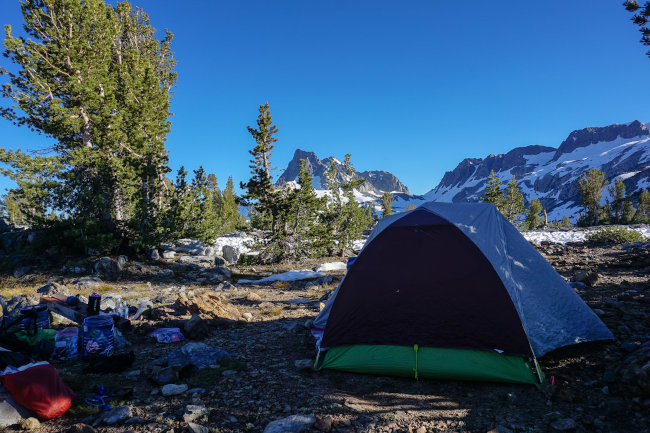July 10th, 2019
Distance: 9 miles
Start: Lyell Fork, mile 33
Camp: Island Pass
We knew we had a good climb ahead of us today, but we had NO idea what we were in for.
Everything we’d read about conditions before the trip said heavy snow. When we first got the start date of July 9th, we figured it would be perfect; abundant water, ideal temperatures, primetime in the Sierra. But it turned out that nature had different plans for us.

2019 was a record snow year. Much of it came mid-February through late March and even April, prolonging the snow season and reducing opportunities to melt off. It was great for drought-busting, but not so great for alpine hikers. We should have taken it as a bad sign that people were still skiing at Mammoth only a couple days before we started.
We had tried to mentally prepare, and even brought ice axes just in case, but neither of us had ever really done extensive snow travel before. So when we got up to the main approach to Donohue Pass and saw the main trail disappear to the right, with the PCT boot track through the snow way off to the left, we were a little apprehensive.
Then we started climbing through the snow. We took the route of the real trail, which thankfully was beginning to be exposed enough to mostly follow along. We followed the map to roughly where it should be and let our intuitions guide us from there.

The route finding aspect was actually pretty fun. We knew where the trail should be, but we got to pick and choose the best way to follow it. We followed a combo of boot track through the snow, outcroppings of exposed rock, and actual trail. Near the end we lost the trail completely and followed a line of flat exposed rock all the way to the top of Donohue Pass.
As cool as that experience can be, we weren’t quite physically prepared for it. Walking through snow is hard and so is scrambling up rocks. We'd been training for sure, but that kind of hiking is a whole different thing. It relies a lot more on tons of stabilizer muscles we were both unused to engaging. In terms of altitude and elevation gain, Donohue shouldn't have been that hard compared to some of the other passes ahead. But looking back I still think of it as one of the hardest just because of how unready we were for that kind of travel.
Needless to say it was extremely slow going, especially in the first few days of dealing with the snow. What kept us going strong up the pass was the idea of having some food at the top and hopefully a clearer trail down on the south slope.

Turns out we were wrong on that too. We were rewarded at the top with a tasty trail snack (jerky and goldfish) and an amazing view, but that amazing view was miles upon miles of snow. Looking out, we figured that the next 3 miles at least would be nearly 100% snow walking, and we were right.

What we didn’t guess then (though we should have) was that there would be hardly any break from snow walking that day at all. We descended the “trail” from the pass, slipping and sliding through the afternoon slush.
We made our way to a section of partially dry trail and ate lunch on a flat rock next to a snowmelt pond only about 3-4 feet deep, but a couple hundred feet wide. It was a unique experience, sitting at 10,00 feet and listening to a chorus of frogs with piles of snow all around us. It’s one I’d be happy to have again any time.

Then we started down the trail again, happy to have something dry under our feet if only for short stretches. Soon enough we were going back uphill toward Island Pass (a pass in the technical sense, but it’s only about a 600 foot climb) and the snow returned. We had hopes of making it to Ruby Lake that day (mile 44ish), but by the time we got to the top of Island Pass we were exhausted from sun-cup climbing and decided to call it a day.
We were at basically the only dry campsite surrounded by snow and still-frozen ponds, so it was cold. But we had an amazing view of Banner Peak and some nice hot food and cocoa, so we were happy.


I closed out my journal that night with this: “Camping at 10,200 feet tonight and I think it’s gonna be coooold. Que sera sera.”
‘What will be, will be’ quickly became my mental motto, especially on snowy days like this one.
